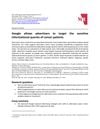4 citations,
May 2022 in “Medicina” Kampo medicine can help treat general fatigue from long COVID.
 2 citations,
December 2021 in “F1000Research”
2 citations,
December 2021 in “F1000Research” Most people in South India lack knowledge about managing COVID-19 at home.
 December 2024 in “International Journal of Molecular Sciences”
December 2024 in “International Journal of Molecular Sciences” Human umbilical cord stem cell vesicles may help treat aging and related diseases.

Google should ban ads targeting cancer patients with sensitive health-related keywords to protect them from misleading information.
 January 2023 in “Brazilian Journals Editora eBooks”
January 2023 in “Brazilian Journals Editora eBooks” Nursing staff's mental health was affected during the COVID-19 pandemic.
 4 citations,
April 2021 in “Experimental and Molecular Medicine”
4 citations,
April 2021 in “Experimental and Molecular Medicine” The conclusion is that certain genetic factors and blood types may affect COVID-19 severity, but changes in ACE2 and TMPRSS2 genes are not clearly linked to it.
 January 2023 in “Brazilian Journals Editora eBooks”
January 2023 in “Brazilian Journals Editora eBooks” Psychiatrists are crucial in pain management teams because they help treat severe pain and related mental health issues.
January 2024 in “Ageing & longevity” Good nutrition and essential trace elements like zinc, selenium, and iron are important for a strong immune system and reducing COVID-19 severity.
 July 2020 in “bioRxiv (Cold Spring Harbor Laboratory)”
July 2020 in “bioRxiv (Cold Spring Harbor Laboratory)” The structure of SRD5A reveals how it reduces steroids, aiding drug design for related health conditions.
 30 citations,
October 2020 in “Nature Communications”
30 citations,
October 2020 in “Nature Communications” Finasteride irreversibly affects human steroid 5α-reductase 2, providing insight into its catalytic mechanism and disease-related mutations.
 1 citations,
July 2020 in “Dermatology”
1 citations,
July 2020 in “Dermatology” Photobiomodulation helps reduce pain, lessen inflammation, heal wounds, and can be used in skin treatments. It also boosts hair growth in women with hair loss and may help fight microbes and prevent respiratory issues in COVID-19.
 January 2023 in “Brazilian Journals Editora eBooks”
January 2023 in “Brazilian Journals Editora eBooks” The document concludes that Passiflora incarnata may help with anxiety, healthcare workers need mental support, common bacteria cause hospital UTIs, telehealth for heart failure needs research, kids' screen time has increased, pregnant teens are mostly okay with their body image, diagnosing post-surgery tuberculosis is hard, older and severely ill people are more likely to have long COVID symptoms, and psychiatrists should be part of pain management teams.
 January 2023 in “Brazilian Journals Editora eBooks”
January 2023 in “Brazilian Journals Editora eBooks” The document concludes that Passiflora incarnata could help with anxiety, telemedicine might improve heart failure care, screen time for kids has increased, pregnant teens in Brazil are mostly okay with their body image, rare tuberculosis infection can occur after knee surgery, older and severely ill people are more likely to have long COVID-19 symptoms, HPLC might diagnose more diabetes cases, and psychiatrists should be involved in pain management.
33 citations,
June 2021 in “Dermatologic Therapy” COVID-19 vaccines can trigger autoimmune flares but are still beneficial for patients with autoimmune conditions.
 7 citations,
May 2022 in “The Journal of Dermatology”
7 citations,
May 2022 in “The Journal of Dermatology” Hair loss is a frequent long-term effect of COVID-19, and oral minoxidil is the most common effective treatment.
 3 citations,
November 2020 in “Journal of The American Academy of Dermatology”
3 citations,
November 2020 in “Journal of The American Academy of Dermatology” The document suggests that more research is needed to confirm if baldness can indicate a higher risk of severe COVID-19 in men.

The document says hair loss can happen after recovering from COVID-19 and it can cause psychological discomfort.
 April 2022 in “Brazilian Medical Students”
April 2022 in “Brazilian Medical Students” People with androgenetic alopecia may have a higher risk of severe COVID-19.
 10 citations,
September 2022 in “Psychiatry and Clinical Neurosciences”
10 citations,
September 2022 in “Psychiatry and Clinical Neurosciences” Long COVID affects over half of COVID-19 survivors, causing a range of symptoms like fatigue and neurological issues, with no specific treatment yet.
 7 citations,
September 2020 in “Journal of Cosmetic Dermatology”
7 citations,
September 2020 in “Journal of Cosmetic Dermatology” Minoxidil and Finasteride are the most popular hair loss treatments, with rising interest in other options, and economic or health crises can change what treatments people prefer.
 3 citations,
October 2022 in “International Journal of Dermatology”
3 citations,
October 2022 in “International Journal of Dermatology” COVID-19 can cause hair and nail disorders after infection.
 2 citations,
August 2022 in “Clinical Case Reports”
2 citations,
August 2022 in “Clinical Case Reports” A 17-year-old girl had severe, on-and-off hair loss, likely due to COVID-19. She was treated with Vitamin D3, biotin, and other supplements, and saw some improvement within a month.
 1 citations,
January 2024 in “Journal of the American Academy of Dermatology”
1 citations,
January 2024 in “Journal of the American Academy of Dermatology” COVID-19 vaccines have been linked to an increase in hair loss conditions.
 October 2023 in “Microorganisms”
October 2023 in “Microorganisms” Nirmatrelvir/Ritonavir treatment may lead to a weaker immune response to COVID-19, but doesn't affect the chance of rebound.
 March 2021 in “The British Journal of Psychiatry”
March 2021 in “The British Journal of Psychiatry” Countries with stricter cultures had fewer COVID-19 cases and deaths, paranoia is linked to false memories, psychosocial intervention works as well with or without antipsychotic drugs for young people with psychosis, smartphones can detect changes in behavior indicating illness relapse, and recruitment agents show regional and gender biases.
 October 2020 in “Journal of Aesthetic Nursing”
October 2020 in “Journal of Aesthetic Nursing” The JCCP wants new rules for the UK aesthetics industry to improve safety and standards.
 1 citations,
June 2023 in “BMC Pediatrics”
1 citations,
June 2023 in “BMC Pediatrics” Most children recovered from COVID-19 in 4 weeks, but some experienced long-term symptoms, especially older kids.
34 citations,
July 2020 in “Dermatologic Therapy” Searches for acne, hair loss, and eczema increased during COVID-19, while searches for other skin issues decreased.
23 citations,
July 2021 in “International journal of laboratory hematology” An 84-year-old man developed severe anemia after his first COVID-19 vaccine shot, improved with treatment, and was advised against a second dose.
 15 citations,
November 2023 in “Immunity & ageing”
15 citations,
November 2023 in “Immunity & ageing” TLR4 is important in aging-related diseases and could be a new treatment target.
























